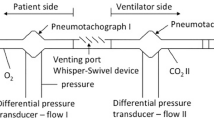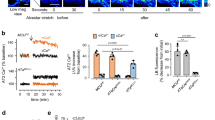Abstract
Pulmonary perfusion disorders provoke atelectasis in order to minimize ventilation/perfusion mismatch. However, the underlying mechanisms remain unknown. Because intraalveolar CO2 concentration ([CO2]iA) declines as a consequence of poor pulmonary perfusion we postulated the existence a novel alveolar CO2-sensing mechanism which adapts the ventilation to perfusion. Real-time fluorescence imaging of rat lungs revealed that low [CO2]iA decreased cytosolic and increased mitochondrial Ca2+ in alveolar epithelial cells (AEC), leading to reduction of surfactant secretion and alveolar ventilation. Mitochondrial inhibition by ruthenium red or rotenone blocked the hypocapnia-induced responses. In cultured Type 2 AEC hypocapnia decreased cytosolic Ca2+ independently from pH and increased the NADH production, the mitochondrial transmembrane potential, and subsequently the mitochondrial Ca2+ uptake. All responses were completely blocked by the gene knockdown of the NADH producing Krebs cycle enzyme isocitrate dehydrogenase. Furthermore, ligature of the pulmonary artery of rabbits decreased alveolar ventilation, surfactant secretion, and lung compliance. Addition of 5% CO2 to the inspiratory gas inhibited all responses. Accordingly, we provide evidence for a novel CO2-sensing mechanism of AEC regulated by the Krebs cycle activity in terms of a negative feedback loop adapting surfactant secretion and thus regional ventilation to pulmonary perfusion.
Similar content being viewed by others
Article PDF
Author information
Authors and Affiliations
Corresponding author
Rights and permissions
About this article
Cite this article
Schulte-Uentrop, L., Goetz, A., Kiefmann, R. et al. A novel alveolar Krebs cycle-triggered CO2 sensing mechanism regulates regional pulmonary ventilation.. Nat Prec (2011). https://doi.org/10.1038/npre.2011.6185.1
Received:
Accepted:
Published:
DOI: https://doi.org/10.1038/npre.2011.6185.1



